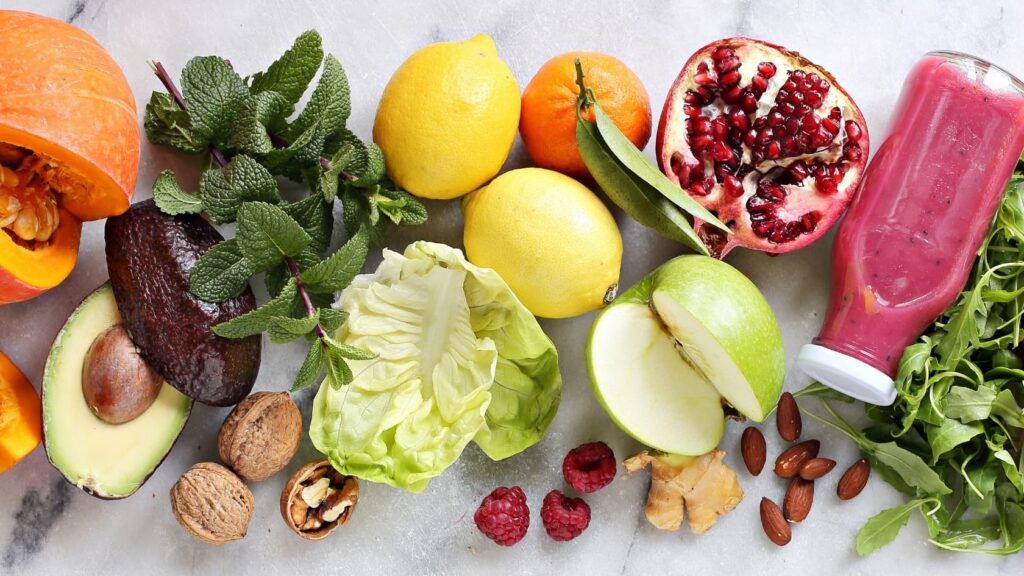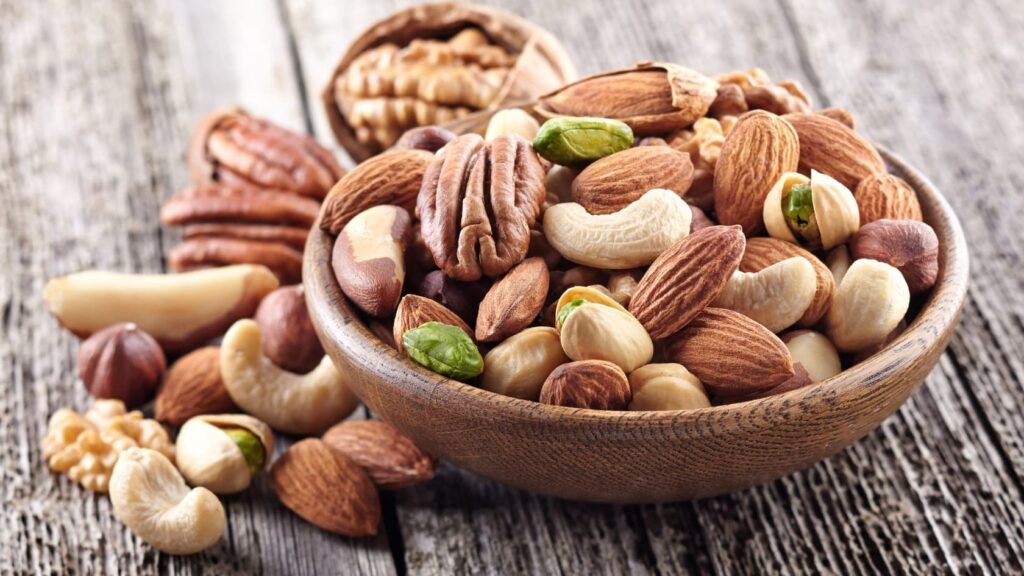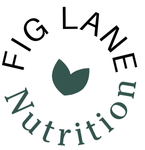A plant-based diet can be great for supporting someone in weight management. It has a naturally high fiber content and can be lower in calories. However, not everyone makes the change to a plant-based diet for the same reason. If you’re looking to gain weight, you may need to use high-calorie plant-based foods to support your energy intake.

How Do High-Calorie Plant-Based Foods Help Weight Gain?
Having worked as a malnutrition dietitian, I’ve seen how difficult maintaining or gaining weight can be for some. Even without a plant-based diet, some struggle with getting enough energy in for all different reasons. Some have changes in appetite, others increased metabolic needs, and for some, out of desire to follow healthier lifestyle. However, plant-based or not, we often looked at where we could add high-calorie foods in their meals, snacks, or beverages to prevent unintentional weight loss or support weight gain. Taking the same approach, below is a list of the top 13 high-calorie plant-based foods that may help support healthy weight gain.
Now you may notice many of the foods listed below are high in fat and while I stuck to heart healthy fat sources, this is due to the fact that fat sources are very calorie dense. Meaning a small amount can offer a significant amount of calories. However, it is important to note that these high-calorie plant-based foods are meant to be a component of a meal or snack and, on their own, do not provide all the essentials for a balanced diet or for weight gain.
High-Calorie Plant-Based Foods
1. Avocado
That’s right, Avocado is a high calorie food. With only 100 g avocado you can get 223 calories (1).
Whether you’re putting on toast, tacos, blended into a smoothie, or mashed into an egg or tuna salad, you get more than just a heart healthy fat source with avocado. Avocado also offers fiber, magnesium, and potassium.
2. Nuts

As a versatile ingredient and convenient snack, nuts can be a great way to boost your calorie intake while also getting a bit of plant based protein along with it.
However, not all nuts have the same nutrition facts. Per 28 gram serving, the amount of protein can vary such as: peanuts(which is actually a legume) with 7 g, almonds with 6 g, pistachio with 6 g, and cashews with 6 g.
Other whole other nuts often have between 2-4 g of protein; the remainder of their high calorie contribution comes from its high heart healthy fat content and complex carbohydrates.
For a 28 gram serving, most have around 180-200 calories (1).
3. Nut butters
Nut butters work great for spreading, dressing, and baking. They are also convenient to support a high calorie road trip meal and or to throw in a smoothie to boost its calories and protein.
Made from nuts, most nut butters have around the same calories and nutrition facts as nuts. However, some nuts are roasted or blended with oil, increasing the calories coming from fat.
4. Seeds
Chia and flax seeds can make a great addition to breakfast or snacks. When ground they make a decent egg substitute in baked goods to give you a boost of fiber and calories. Sesame seeds or their paste (tahini) can also be added to all different types of dishes, both sweet and savory. Both offer heart healthy fats but tahini also offers a plant-based source of calcium.
Similar to nuts, seeds have around 180-200 calories per 28 grams (1).
5. Oils and Dressing
Olive oil, avocado oils, cannoli oil, vegetable oils are all high in calories while also low in saturated fat. They can be used to cook or dress your food to increase the calories as a little drizzle goes a long way.
Being 100% fat, 1 gram of oil has 1 gram of fat, there for a 1 tbsp serving has 126 calories (1).
6. Quinoa
One of the few complete plant based protein sources, quinoa also has heart healthy fat and complex carbohydrates. This makes it great for a base of a grain bowl, in soups, or as an easy to meal prep high protein breakfast option.
1 cup of 185 grams of cooked quinoa you can get 222 calories with 8 grams of plant based protein. If you add a oil to the liquid while its cooking you can increase the calories even more (1).
7. High-Protein Non-dairy Beverages
Unsweetened almond milk is probably the lowest calorie plant-based milk out there. However, when fortified with plant-based protein and fats, you’ve got an easy way to boost your calorie intake with a beverage. You can also mix it into dishes or with other beverages (smoothies, protein drinks, etc).
The nutrition facts change brand to brand and product to product. However, going off some of the most popular brands nutrition facts, 8 oz of their non-dairy beverages offer around 120 calories with 7-8 grams of protein (1).
8. Dried fruit
Dried fruits make a convenient pre-workout snack or energy boost for a salad, cereal, or trail mix. As long as they do not contain added sugars, dried fruit get their sweetness from the natural sugar found in fruit. It often tastes sweeter than the fruit itself because when it is dehydrated it removes moisture that can essentially provide some solution to the sugar. Therefore the sugar is where the majority of the calories come from in fruit gets concentrated.
1/4 cup or 40 grams of dried fruits suck as apples, prunes, raisins, and mango (listed in order of calorie density) have 100-140 calories (1).
9. Granola
Granola gets its high calorie content often from using a combination of the ingredients above and a grain. Because of this combination you’re getting those calories from whole grains, fat source, and you can even use ingredients to boost the protein as well making it a high calorie crunchy topping for high protein plant-based yogurts. You can experiment at home by making savory granolas to top a labneh dish, substitute for croutons, or in a creamy soup for some texture.
The nutrition facts of granola is going to change with the ingredients or recipe. Some granolas have around 120-130 calories for just 1 oz of 28 grams (1).
10. Teff
Teff, if you haven’t heard of it, is a very small grain, we are talking almost like sand. It is sometimes ground into a flour to make flatbreads. It can also be eaten as a porridge or added to granola or energy bars.
1 cup of 252 grams of cooked teff offers 255 calories. It also has several other nutritional perks such as 9 grams of plant-based protein, 7 grams of fiber and 5 mg of iron (1).
11. Dates
Most of the time found dried, dates are very high in natural sugars. Dates combined with nut butter can make an easy high calorie snack. Dates can also be used to make desserts or as a sweet topping for some oatmeal.
With only 40 grams or 4 dates, you can get 130 calories (1).
12. High-Calorie Plant-Based Smoothies
Like granola, high calorie plant based smoothies get its energy content often by using a combination of the ingredients above. For example a high-protein non-dairy milk, avocado or nut butter, along with fruit and a plant-based protein powder can give you a high-calorie smoothie.
The great part is, even if you drink smoothies regularly, it’s easy to change the flavors to keep it interesting.
Smoothies can be used in-between meals if you don’t feel like snacking. It also works great as breakfast if you don’t have the time or appetite to start off your day with a solid meal.
Depending on how big or what’s added to the smoothie you can really customize it towards your goals. Looking for something to give you more carbs for a workout or run, using more lower fiber fruits a lower fat protein powder and leaving out the fat source could help. Looking for something a little more satisfying to using in place of a meal, adding a nut butter, higher fiber fruits or even some quick oats can help.
13. Juice
100% juice, similar to dried fruit gets its high calorie content from the concentration of the sugars in dried fruit. However, unlike dried fruit, instead of removing the water, it is the plant fiber that is removed. Juices on a plant-based diet not only are calorie dense but when fortified can also support your calcium intake.
Aside from just a beverage they can be made into ice pops, added to smoothies, mixed with plant-based protein powder, or used to marinate foods.
12 oz of 100% orange juice has 170 calories (1).
Take Away
Whether you’re looking to lose weight, gain, or maintain your weight there are plant-base foods to support you.
Above are 13 High-Calorie plant-based goods that can support weight gain with their calorie density. However, balancing the intake with a variety of foods is important to gain or maintain weight in a healthy manner. Making food choices mindfully can make a big difference in achieving your goals when making any big diet change.

Pingback: Savory Vegan Granola Recipe - Fig Lane Nutrition
Pingback: 15 Common Mistakes When Starting a Plant-Based Diet - Fig Lane Nutrition